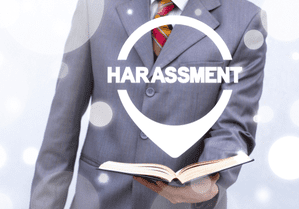Starting Jan. 1, 2020, all employers in Illinois have been required to provide annual employee training on workplace sexual harassment prevention. Additional information on the training requirements is available here.
In addition, starting July 1, 2020, all provisions of the Illinois Human Rights Act (IHRA) apply to every employer in the state, regardless of size (the law previously only applied to those with 15 or more employees).
These changes, among others, were made under new laws that the state enacted in August 2019 to expand existing protections against workplace discrimination and harassment. This document provides an overview of the law’s prohibitions and requirements related to sexual and other types of unlawful workplace harassment.
Training Requirements
Every employer that has employees working in Illinois must either adopt the Illinois Department of Human Rights’ (IDHR) model sexual harassment prevention training program as its own or use a different program that meets or exceeds the model’s minimum standards and present it to each of its employees.
Every employee (regardless of status, such as short-term, part-time or intern) must receive the training at least once every calendar year. The deadline to provide the initial training to existing employees was Dec. 31, 2020. New employees should be trained as soon as possible after hire, but no later than the Dec. 31 of the year they were hired.
At minimum, the law requires an employer’s training program to include:
- An explanation of sexual harassment under Illinois law;
- Examples of conduct that constitutes unlawful sexual harassment;
- A summary of relevant federal and state statutory provisions concerning sexual harassment, including remedies available to victims of sexual harassment; and
- A summary of responsibilities of employers in the prevention, investigation and corrective measures of sexual harassment.
Employers must also keep a record of all trainings they provide. These records, which may be in the form of written or electronic certificates, signed employee acknowledgements or course sign-in worksheets, must be made available for IDHR inspection upon request.
Restaurants, bars, hotels and casinos in the state are subject to additional training requirements, as described later in this document.
Expanded Protection Against Harassment
Illinois’ existing IHRA protects employees and applicants from employment discrimination based on certain protected traits. Effective Jan. 1, 2020, amendments to the IHRA clarify that the term “unlawful discrimination” includes actions based on an individual’s actual or perceived:
- Race
- Color
- Religion
- National origin
- Ancestry
- Military status
- Sex
- Marital status
- Disability
- Order of protection status
- Age
- Sexual Orientation
- Pregnancy
- Unfavorable discharge from military status
Harassment Prohibition
Also effective Jan. 1, 2020, “harassment” is a category of unlawful employment practices that is separate and distinct from “sexual harassment.” Under this provision, unwelcome conduct that is based on any of the protected traits listed above, plus any unwelcome conduct that is based on an individual’s actual or perceived citizenship status, is unlawful when it has the purpose or effect of:
- Substantially interfering with an individual’s work performance; or
- Creating an intimidating, hostile or offensive working environment.
By contrast, the law’s existing definition of “sexual harassment” includes any unwelcome sexual advances or requests for sexual favors and any conduct of a sexual nature when:
- It has either of the above purposes or effects; or
- Submission to or rejection of it affects the victim’s employment.
For purposes of both definitions, the amendments clarify that the phrase “working environment” is not limited to a physical location where an employee is assigned to perform his or her duties.
Nonemployee Protections
The amendments added prohibitions against engaging in or allowing harassment or sexual harassment of nonemployees. Specifically, the IHRL now permits contractors, consultants and any other person who provides services under a contract with an employer to hold the employer liable for any unlawful harassment or sexual harassment that occurs on or after Jan. 1, 2020.
However, the changes also state that when any harassment or sexual harassment is committed by an employer’s nonmanagerial or nonsupervisory employees (regardless of whether the victim is an employee, applicant or nonemployee), the employer may be held liable only if it became aware of the conduct and failed to take reasonable corrective measures.
Contracting Restrictions
Amendments to the IHRL made under the Workplace Transparency Act (WTA) made certain types of contractual provisions void and unenforceable. These amendments also allow individuals to recover reasonable attorney’s fees and costs from employers that violate the law by including the newly prohibited provisions in a contract.
Confidentiality Agreements
First, any settlement or termination agreement that an employer enters into with an employee, former employee or applicant on or after Jan. 1, 2020, may not include any promises of confidentiality related to any alleged unlawful employment practices, unless:
- Confidentiality is the documented preference of the employee, former employee or applicant, and is mutually beneficial to both parties;
- The employer notifies the employee, former employee or applicant, in writing, of his or her right to have an attorney or representative of his or her choice review the settlement or termination agreement before it is executed;
- There is valid, bargained-for consideration in exchange for the confidentiality; and
- The settlement or termination agreement does not waive any future claims of unlawful employment practices.
In addition, when an employee, former employee or applicant prefers to include a confidentiality provision, the employer must first provide a written copy of the proposed contract to him or her, and a 21-day waiting period applies. The employee, former employee or applicant may sign the agreement any time within those 21 days, as long as he or she knowingly and voluntarily waives any further time for consideration. After executing the contract, the employee, former employee or applicant has the right to revoke it for seven days, and the agreement does not become effective or enforceable until the revocation period expires.
Claim Waivers and Arbitration Agreements
Second, any agreement an employer makes with an employee or applicant on or after Jan. 1, 2020, may not unilaterally condition the individual’s employment on him or her being:
- Prevented from making truthful statements or disclosures about alleged unlawful employment practices; or
- Required to waive, arbitrate or otherwise diminish any existing or future claim, right or benefit related to an unlawful employment practice.
However, employers and individuals may mutually agree to conditions described above, as long as the mutual agreement is in writing, demonstrates actual, knowing and bargained-for consideration, and acknowledges the employee or applicant’s rights to:
- Report any good faith allegation of unlawful employment practices to any appropriate enforcement agency or official;
- Participate in a proceeding with any appropriate enforcement agency;
- Make any truthful statements or disclosures required by law, regulation or legal process; and
- Request or receive confidential legal advice.
Annual Reporting Obligations
Beginning July 1, 2020, and by each July 1 thereafter, every employer in the state that had an adverse judgment or administrative ruling against it in the preceding calendar year must file a report with the IDHR. For this purpose, the phrase “adverse judgment or administrative ruling” means any final and non-appealable judgment or administrative ruling entered in favor of a claimant in which there was a finding of sexual harassment or unlawful discrimination under either the IHRA, Title VII of the federal Civil Rights Act, or any other federal, state or local law that prohibits sexual harassment or unlawful discrimination.
An employer’s report must include the following information:
- The total number of adverse judgments or administrative rulings during the preceding year
- Whether any equitable relief was ordered against the employer in those judgments or rulings
- How many of the judgments or rulings were for claims of sexual harassment
- How many of the judgments or rulings were for claims of discrimination or harassment based on each of the following categories:
- Sex
- Age
- Religion
- Disability
- Race, color or national origin
- Sexual orientation or gender identity
- Military status or unfavorable discharge from military status
- Any other characteristic protected under the IHRL
In addition, any employer that is under investigation by the IDHR may be required to provide information about any settlements it made for claims of unlawful employment practices in the preceding five years.
Industry-Specific Requirements
Effective Jan. 1, 2020, every restaurant and bar that operates in Illinois must:
- Provide additional annual training on sexual harassment prevention, as a supplement to required training described above, to every employee, regardless of employment classification;
- Establish a written sexual harassment prevention policy;
- Provide a written copy of its policy to each employee within the first calendar week of hire; and
- Post a copy of its policy in the workplace.
The new law lists specific provisions that restaurants and bars must include in their written policies and also directs the IDHR to produce a model program that employers may use to provide the supplemental training.
Effective July 1, 2020, every hotel and casino operating in the state must:
- Provide a safety or notification device to each employee who is assigned to work in a guest room, restroom or casino floor under circumstances where no other employee is present;
- Develop, maintain and comply with a written anti-sexual harassment policy to protect employees against sexual assault and sexual harassment by guests;
- Provide all employees with a current copy of its policy in both English and Spanish (and make a good-faith effort to provide it in any other language spoken by a predominant portion of its employees); and
- Post a current copy of its policy, in both English and Spanish, in conspicuous places where employees can reasonably be expected to see it.
The Hotel and Casino Employee Safety Act, also makes it unlawful for a hotel or casino to retaliate against an employee for reasonably using a safety device or notification device or taking any other actions allowed under the law. A hotel or casino employee who believes an employer has violated these requirements may sue the employer in the circuit court and obtain various remedies including reinstatement, compensatory damages, and reasonable attorney’s fees and costs.
Civil Penalties
The table below lists the maximum civil penalties an employer may face if it fails to provide the annual sexual harassment prevention training (including the supplemental training for restaurants and bars) or to file annual reports with the IDHR as required.
|
Employer Size |
First Offense |
Second Offense |
Third or Subsequent Offense |
|
Fewer than four employees |
$500 |
$1,000 |
$3,000 |
|
Four or more employees |
$1,000 |
$3,000 |
$5,000 |
More Information
Contact The Horton Group, Inc. for more information on fair employment laws in Illinois.
Material posted on this website is for informational purposes only and does not constitute a legal opinion or medical advice. Contact your legal representative or medical professional for information specific to your legal or medical needs.




